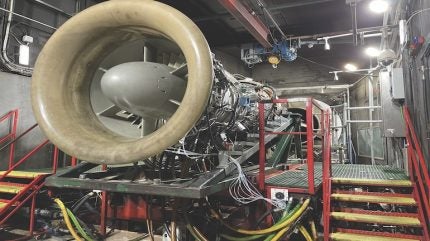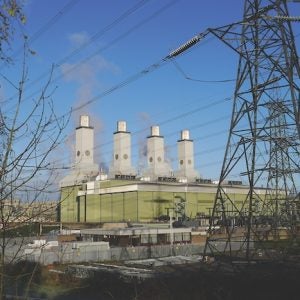
One of the benefits of methanol as an alternative to traditional fossil fuels is that it can be produced from a range of feedstocks, including lower carbon intensity routes involving carbon capture and storage (blue methanol), biogenic sources (bio-methanol) and green hydrogen with captured CO2 (e-methanol).
Widely available conventional methanol, produced from natural gas, can result in a 10% reduction in CO2 emissions today compared with traditional liquid fuels. Renewable methanol can cut CO2 emissions by up to 95%.
Use of methanol, in all its forms, significantly reduces other emissions, including NOx, PM, SO2 and smoke. The demonstration test showed a decrease in NOx of up to 80%.
Siemens Energy and NZTC carried out the demonstration at RWG’s test facility in Aberdeen. It was witnessed by methanol producer Proman, which contributed the methanol fuel for the test.
The aeroderivative SGT-A35 gas turbine, now rated at 38 MW, was introduced to the market by Rolls-Royce in the 1970s as the Industrial RB211. Used both offshore and onshore for power generation and mechanical drive, there are 800 plus machines worldwide, which have accumulated over 46 million operating hours.
Siemens Energy used 3D printing techniques to manufacture the new components required for methanol fuel conversion.
This latest demonstration builds on a 2023 world-first collaboration between NZTC and Siemens Energy that saw an SGT-A20 turbine running on bio-methanol. This showed CO2 emissions could be reduced by up to 75% when compared to conventional fuels.
Conventional methanol can be blended with increasing amounts of blue or green methanol to meet customer needs and achieve specific carbon intensity targets supporting the decarbonisation pathway.
The demonstrations are being delivered through NZTC’s Alternative Fuel for Gas Turbines project, one of seven projects under NZTC’s Net Zero Technology Transition Programme (NZTTP). NZTTP is funded with £16.5 million from the Scottish government’s Energy Transition Fund and industry matched funding to transform the North Sea energy system.
NZTC, established in 2017, is a not-for-profit organisation working with industry, government and academia driving innovation to accelerate the energy transition.
It was created as part of the Aberdeen City Region Deal, with £180 million of UK and Scottish government funding with the aim of helping to maximise the potential of the North Sea.






